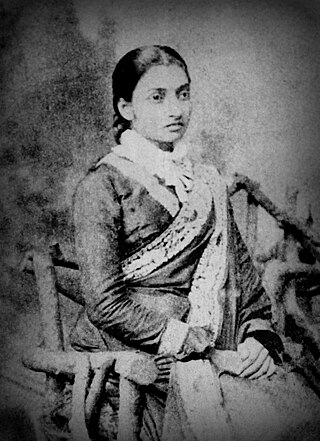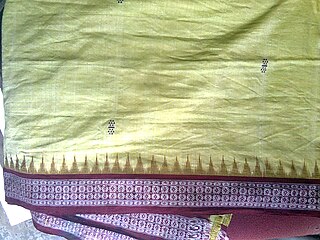Related Research Articles

A sari is a women's garment from the Indian subcontinent. It consists of an un-stitched stretch of woven fabric arranged over the body as a robe, with one end attached to the waist, while the other end rests over one shoulder as a stole, sometimes baring a part of the midriff. It may vary from 4.1 to 8.2 metres in length, and 60 to 120 centimetres in breadth, and is a form of ethnic wear in India, Sri Lanka, Nepal, Bangladesh, and Pakistan. There are various names and styles of sari manufacture and draping, the most common being the Nivi style. The sari is worn with a fitted bodice also called a choli and a petticoat called ghagra, parkar, or ul-pavadai. It remains fashionable in the Indian subcontinent today.

Tamil Jains are ethnic-Tamils from the Indian state of Tamil Nadu, who practice Jainism,. The Tamil Jain is a microcommunity of around 85,000 .They are predominantly scattered in northern Tamil Nadu, largely in the districts of Tiruvannamalai, Kanchipuram, Vellore, Villupuram, Ranipet and Kallakurichi. Early Tamil-Brahmi inscriptions in Tamil Nadu date to the third century BCE and describe the livelihoods of Tamil Jains. Samaṇar wrote much Tamil literature, including the important Sangam literature, such as the Nālaṭiyār, the Cilappatikaram, the Valayapathi and the Civaka Cintamani. Three of the five great epics of Tamil literature are attributed to Jains.

Jamdani is a fine muslin textile produced for centuries in South Rupshi of Narayanganj district in Bangladesh on the bank of Shitalakhwa river.

The Madisar or Koshavam is a typical way in which the sari is worn by Tamil Brahmin women. The sari and the tying style dates back to ancient India, at least as far back as the period between 2nd century BC to 1st century AD when the antariya and uttariya garments were merged to make a single garment. This style of tying the saree is the "koshavam" style. Tamil Brahmin women are required to use this style after their marriage. Different communities have evolved different sari styles from the original koshavam style, that requires more material - nine yards. Extant nine-yard sari styles include the nauvari of Maharashtra, the Kannada drape, the Telugu Brahmin style. The name Madisari is however typically associated with Tamil Brahmins, with two sub-styles: the Iyer kattu (tie) and the Iyengar kattu (tie). Today, madisar is hardly worn as daily wear, although women do drape the madisar style on select festive occasions and religious ceremonies. The madisar requires a nine-yard sari to wear it, unlike the current modern version of sari wearing style which needs 6 yards. Both Iyer and Iyengar Brahmins are supposed to wear madisars at ceremonial/ religious occasions, such as the wedding ceremony, the Seemantham, all religious ceremonies, Puja, and death ceremonies.

A Banarasi sari is a sari made in Varanasi, an ancient city which is also called Benares (Banaras). The saris are among the finest saris in India and are known for their gold and silver brocade or zari, fine silk and opulent embroidery. The saris are made of finely woven silk and are decorated with intricate designs, and, because of these engravings, are relatively heavy.
Chengam is an important market town and a taluk headquarter in the Foot hills of Eastern ghats in Tiruvannamalai district of Tamil Nadu, India. Chengam is the gateway to the Chengam pass in the Eastern ghats between Javvadhu hills to the north and Chennakesava hills to the south. The town is also the centre for various industrial activities which includes Sathanur dam hydro-electric project, Aavin milk processing plant and Periya Kolappadi SIDCO estate.
Aarani, officially spelled as Arni, and also known as Periya Aarani, is a major commercial, industrial and cultural hub and also a divisional headquarter in the Thiruvanamalai district of Tamil Nadu, India. The town is the second largest urban center next to the district headquarters, Thiruvannamalai, and is administered by a selection grade municipality. Aarani is home to silk weaving, spinning mills and agricultural industries. Famous Aarani silk and a paddy variety named Aarani Ponni, known for its rich aroma, originates from Aarani. The town is often nicknamed as The Silk City. Aarani also has a rich cultural heritage as it is a major center of Tamil Jainism.
Uthukottai is a town in Suburbs of Chennai, one of the taluk headquarters in Thiruvallur District Tamil Nadu, also one of the border towns of Tamilnadu - Andhra Pradesh, located on the banks of the Arani River. This town is the central hub for many nearby towns and villages for their needs of education, markets, shops, businesses, banks, travel, transport and entertainment(Movie Theatres, badminton courts, cricket grounds, Gyms). The town features a channel which helps to direct water from the Krishna River for local irrigation.
A langa voni is a traditional dress worn in South India by girls between puberty and marriage. It is also known as the two-piece sari or half sari. Girls younger than this may wear it on special occasions.

The Kaashtha sari is a Koli style of sari draping very similar to the way the Maharashtrian dhoti is worn. The word Kaashtha refers to the sari being tucked at the back. Since this sari is usually worn by using a single nine yard cloth, it is also referred to as Nauvari, which means Nine Yards. Sakachcha sari is another term commonly used to refer to this style of sari. It is referred to as Akanda Vastra, which means it doesn't need any other attire to support it. In fact, this attire holds utmost importance as women across different walks of life have worn it. It is not just worn at religious and cultural events, but women have fought wars in the past and still work in farmlands wearing this.

Vellore Lok Sabha constituency is one of the 39 Lok Sabha (parliamentary) constituencies in the present state of Tamil Nadu in Southern India. Its Tamil Nadu Parliamentary Constituency number is 8.

Bomkai sari or Bomkai Saree is a handloom saree from Odisha, India. It is an origin of Bomkai village from Ganjam district, however later it is mainly produced by the Bhulia community of Subarnapur district. Bomkai is one of the identified Geographical Indications of India. Bomkai Sarees are popular items displayed at various fashion shows.

Tiruvannamalai district is the second largest district in Tamil Nadu by area after Dindigul District and one of the 38 districts in the state of Tamil Nadu, in South India. It was formed in the year 1989 through the bifurcation of North Arcot into the Tiruvannamalai Sambuvarayar and Vellore Ambedkar districts. The city of Tiruvannamalai is the district headquarters.

Sanjai Gandhi is an attorney at law specializing at intellectual property rights. Gandhi had been instrumental in getting protection under Geographical Indication Act, 1999 for more than 15 Geographical indications (GI) for the state of Tamil Nadu, India. The products for which IPR attorney Sanjai Gandhi has obtained GI protection are: Kancheepuram Silk Sarees, Bhavani Jamakkalam (bedsheet), Madurai Sungudi Saree, Salem White Silk, Kovai Cora Cotton, Arani Sari, Thanjavur Paintings, Thanjavur Dancing Doll, Ethomozhi Tall Coconut of Kanyakumari district and Tangaliya Shawl of Gujarat, Thanjavur Veenai, Mahabalipuram Stone Sculpture, Thirubuvanam Silk Sarees, Dindigul Locks, Srivilliputtur Palkova, Kandangi Saree, Arumbavur Wood Carving, and Thanjavur Pith Work.

The Kanchipuram silk sari is a type of silk sari made in the Kanchipuram region in Tamil Nadu, India. These saris are worn as bridal & special occasion saris by most women in Tamil Nadu, Kerala, Karnataka & Andhra Pradesh. It has been recognized as a Geographical indication by the Government of India in 2005–2006.

Baluchari Sari is a type of sari, a garment worn by women in the Indian states of West Bengal, Tripura and Assam and the country of Bangladesh. This particular type of sari originated in West Bengal and is known for depictions of mythological scenes on the anchal of the sari. It used to be produced in Murshidabad but presently Bishnupur and its surrounding areas of West Bengal are the only place where authentic Baluchari saris are produced. It takes approximately one week to produce one such sari. In 2011, the Baluchari Sari was granted the status of Geographical Indication for West Bengal in India.
Gollabhama sari also Siddipet Gollabhama are saris made in Siddipet, Telangana, India. These cotton saris are popular for their inlay figure work and motifs.

Kalpana Shah is an Indian sari draper, stylist, author, and entrepreneur. She resides at Altamount Road, Mumbai, India. She has practiced the art of sari draping since 1985. She gives sari draping lessons and workshops and drapes saris for formal events.

Kandangi is a type of cotton saree from the Chettinad region of the Indian state of Tamil Nadu. It was declared as a Geographical indication in 2019–20.

M. K. Vishnu Prasad is an Indian politician from Tamil Nadu, India. He is the working president of Tamil Nadu Congress Committee of Indian National Congress party. He was a former Tamil Nadu Youth Congress President for the year 2003. He is the son of M. Krishnasamy.
References
- ↑ RADHIKA SANTHANAM (2 January 2013). "GI can protect handicrafts from abuse". Business Line.
- ↑ "Kanchipuram Sari – Tamilnadu". Tamilnadu.com. 16 October 2012. Archived from the original on 11 April 2013.
- ↑ "Madisar Pudavai". Tamilnadu.com. 5 February 2013.
- ↑ "GI shield for state's silk fabrics". The Times of India . Archived from the original on 16 February 2013.